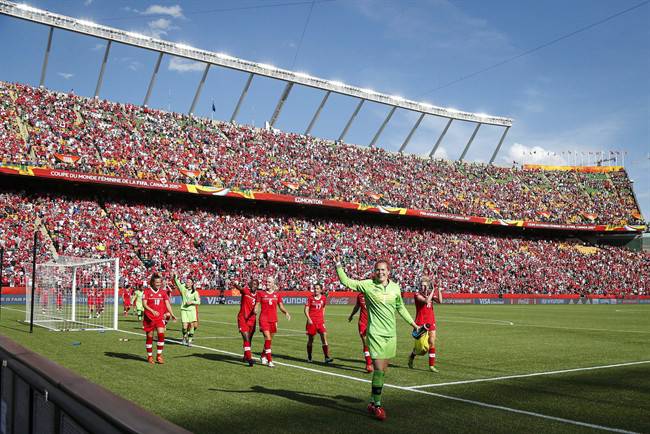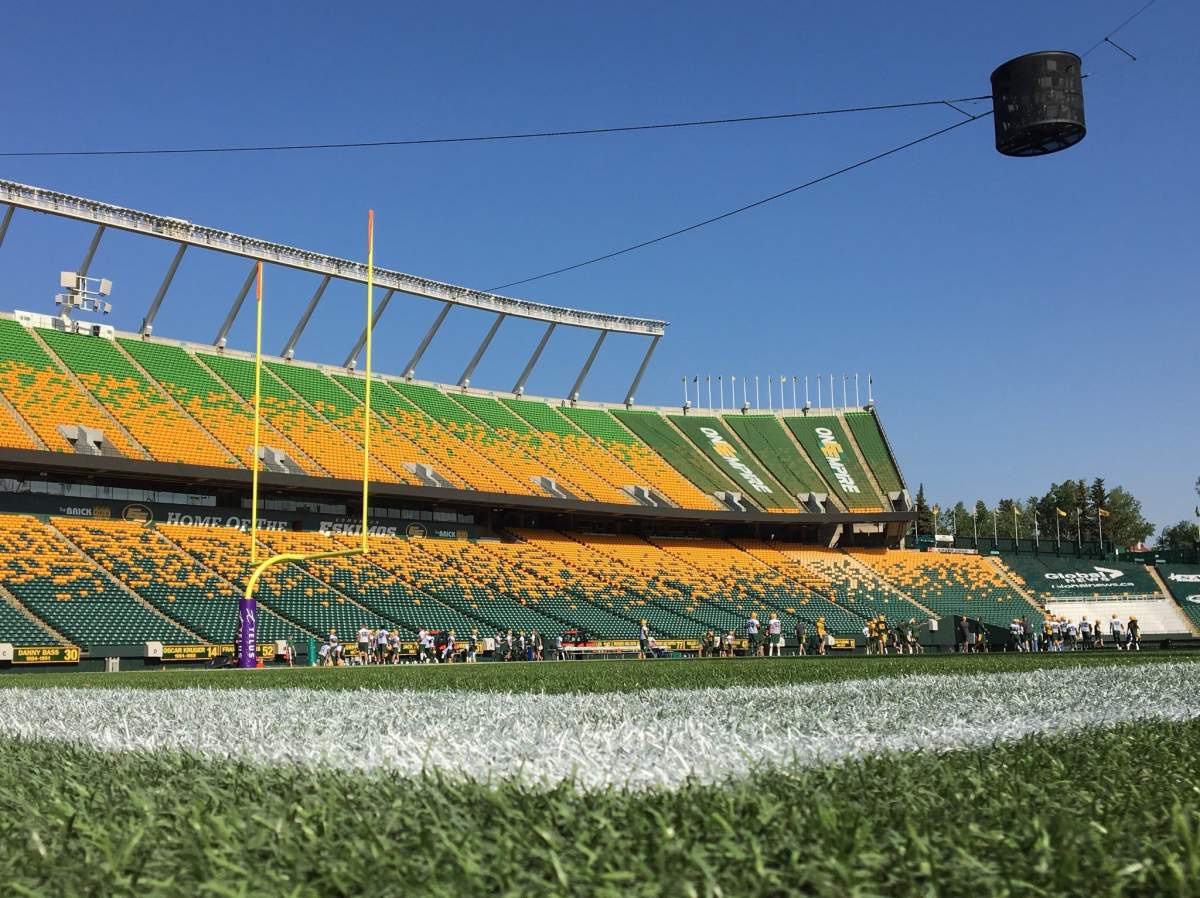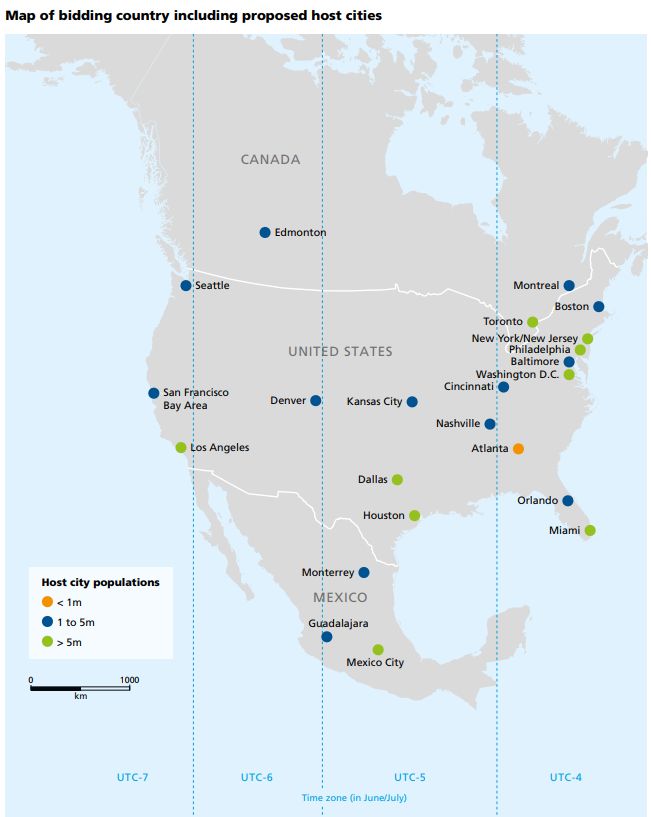If FIFA picks the North American bid to host the 2026 World Cup, Canada would most likely host 10 games, while Mexico would host another 10, and the remaining 60 games would take place across the United States.

READ MORE: Unified 2026 World Cup bid defends decision to have U.S. host lion’s share of games
The three Canadian stadiums in the running are Montreal’s Olympic Stadium, Toronto’s BMO Field and Edmonton’s Commonwealth Stadium.
In total, 23 stadiums in Canada, the United States and Mexico were submitted for consideration.
In Canada, Edmonton could have a leg up to host the most matches because at over 56,000 seats, Commonwealth Stadium has the largest outdoor stadium capacity in Canada.
However, the nearly 40-year-old building would need some major upgrades such as replacing the artificial turf with real grass, updating the washrooms, and possibly installing a second jumbo screen.
READ MORE: Edmonton could host 4 soccer matches if United 2026 FIFA bid selected
All three Canadian stadiums could host a round-of-16 game, but none have been identified as a location for a quaterfinal, semifinal or final match.
Stadiums in Los Angeles and New York/New Jersey were identified for the opening match and/or final game, while Mexico City was flagged as a location for the opening game and Dallas as a location for a final or semifinal. Other stadiums considered for the semifinals are in Atlanta, Boston, and Washington, D.C.
How does Edmonton fare?
Commonwealth Stadium was ranked as the fifth best stadium in the united bid, coming in behind Denver, San Francisco, Miami and Houston.
However, Edmonton ranked the worst for accommodations, and was second worst for transportation options, with only Guadalajara, Mexico being viewed as worse.

Get daily National news
FIFA said Edmonton and Philadelphia meet FIFA’s minimum requirements for inventory, but the cities have limited “top-tier” hotel options.
READ MORE: Commonwealth Stadium would get real grass for World Cup year: Edmonton staff
FIFA also expressed concern with Edmonton’s airport. While Montreal and Toronto have airports with annual usage figures of 17 and 44 million people per year respectively, Edmonton’s smaller airport handles about seven million passengers per year.
“In the case of Edmonton, with less than ten million users per year, this could call into question its positioning as an international gateway,” the report said.
Because of Commonwealth Stadium’s central location, Edmonton fell in the “fair” to “good” category when FIFA looked at public transport capacity between city centres and the proposed stadiums.
FIFA noted some other cities — such as Boston, Dallas, Guadalajara, Kansas City and Los Angeles — have stadiums that are remote from their respective city centres, “with regular public transport services between the two generally insufficient.”
READ MORE: Hosting part of 2026 FIFA World Cup to cost $35-$55 million: City report
Of the 23 stadiums proposed, all are already in existence and are fully operational, but six stadiums foresee renovations needed in the coming years. According to the bid documentation, two of the 23 stadiums (Cincinnati and Montreal) would require a combined US$335.5 million in upgrades and renovations.
READ MORE: Edmonton will submit joint bid to host 2026 FIFA World Cup
Another four stadiums were identified needing renovation work, but the total cost and time needed to do the work is not yet known.
The FIFA evaluation report released Friday said while the united 2026 bid currently includes 23 stadiums spread across 23 candidate host cities in the three countries (three in Canada, three in Mexico and 17 in the United States), it would be narrowed down to 16 stadiums in 16 cities if successful.
North American World Cup bid outscores ‘high risk’ Morocco
The North American bid to host the 2026 World Cup outscored Morocco following inspections, with FIFA on Friday labeling the North African proposal “high risk” in three areas.
READ MORE: North American countries expected to top Moroccan bid to host 2026 World Cup
The joint bid from the United States, Canada and Mexico scored four out of five, while Morocco scored 2.7 following FIFA inspections.
Morocco’s high risks relate to stadiums, accommodation and transport. No part of the North America bid was flagged a high risk.
FIFA’s five-man panel could have disqualified Morocco had the North African country scored less than two overall, and less than two on key measures including stadiums.
The FIFA council has to approve both candidates at a June 10 meeting in Moscow. The final vote of up to 207 member federations is on June 13 and the inspection task force scores can be ignored when making their decision. The winning bid must receive 104 votes.
FIFA ordered more rigorous inspections after criticism of the 2018-2022 World Cup votes in 2010, with a five-man delegation this time paying the countries week-long visits in April.
READ MORE: Bidding process for international sporting events is changing
FIFA sent a second group of officials to Morocco after finding deficiencies in their bid offering, including the stadiums proposed. The Associated Press also revealed that Morocco did not declare its anti-LGBT law to soccer’s governing body in the human rights risk assessment included in the bid book.
While Morocco has said it needs to spend almost $16 billion on infrastructure for the 48-team World Cup, including building or renovating all 14 stadiums, the North American bid does not require any tournament-specific building work.
The new batch of technical staff being deployed from FIFA HQ to Morocco did not make a similar follow-up visit to North America after the task force inspected the rival bid’s facilities this month.
READ MORE: More cities follow Vancouver out the door on FIFA World Cup bid
But the North American campaign has been dogged by questions on the impact of policies from the Trump administration, including attempts to implement a ban on travel by residents of six majority-Muslim countries.
The U.S. offered fresh guarantees to FIFA there will be no discrimination around entry to the United States at a World Cup in 2026.
— With files from Rob Harris And Graham Dunbar, The Associated Press










Comments